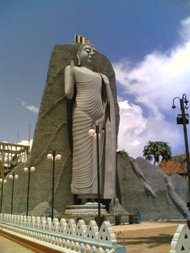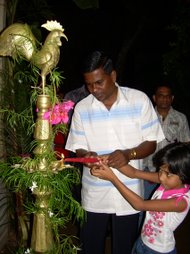Only through democracy can peace be attained
------ Daily Mirror
By Sanjana Hattotuwa
The tragedy of Sri Lanka today is such that the government’s shrill response to the assessment of Sri Lanka’s dire humanitarian and human rights situation by Sir John Holmes, Undersecretary-General for Humanitarian Affairs and Emergency Relief Coordinator was, regrettably, expected – only the degree of the petulance was surprising. While the Government’s war efforts continue apace and North-bound, its interest in strengthening and securing human rights mechanisms continues to wane. That this erosion in human rights mechanisms in Sri Lanka is taking place with near total impunity and in the full glare of international actors poses significant challenges for conflict transformation.
It is argued that the most virulent of criticism against NGOs, INGOs, humanitarian organizations including the UN and international human rights organizations are aimed at a local vote base and often only finds expression in the vernacular. However, it is also evident that calling senior international diplomats terrorists in the pay of the LTTE is a telling indicator of the complete waste of any engagement with this Government on matters related to democratic governance, fundamental rights and a political settlement to the conflict.
It comprehensively negates well into the future our ability to engage in any meaningful conflict transformation that goes beyond simplistic black and white definitions of and solutions to terrorism. Adept war strategists they may be, but the government has as much chance of bringing peace and defeating terrorism in Sri Lanka as the Bush administration has in Iraq. In The War as We Saw It, a recent article on Iraq in the NY Times coincidentally co-authored by a Sri Lankan born US Army Specialist stated,
In a lawless environment where men with guns rule the streets, engaging in the banalities of life has become a death-defying act. Four years into our occupation, we have failed on every promise, while we have substituted Baath Party tyranny with a tyranny of Islamist, militia and criminal violence. When the primary preoccupation of average Iraqis is when and how they are likely to be killed, we can hardly feel smug as we hand out care packages. As an Iraqi man told us a few days ago with deep resignation, “We need security, not free food.”
Clearly, this resonates with the wretched life of many communities in the embattled North and East of Sri Lanka and even those elsewhere in the country. Two years into our own war against terror, all we have to show is a fear psychosis and a growing sense of anxiety across the country on account of real, perceived and fabricated terrorist threats. Images of the SL Army in Toppigala perhaps purposefully resembling Liberty Leading the People by Delacroix and the iconic Joe Rosanthal photo of the flag-raising atop Mount Suribachi at the end of the Second World War were used in a media blitz by the government to demonstrate its prowess at waging and winning the war against the LTTE. Problem is, Toppigala isn’t a symbol of liberation or a marker of the establishment of freedom and security in the East.
Democracy in Sri Lanka is withering on the vine and not just in the East. The recent reports by COPE suggest that corruption is endemic and the mismanagement of public finances rife. However, meaningful investigations in bribery and corruption are stalled. At the time of writing, the rupee has depreciated against the US dollar 13 times in a row. News of the purchase of an Aston Martin DB9 for 45 million rupees by the son of a politician is front page news. The APRC, a mechanism that this government assured us would deliver a political blueprint for the resolution of the ethnic conflict, is suspended. People go missing and some turn up dead in mass graves. These are wretchedly familiar issues of a breakdown in law, governance and democracy with significant impact on peacebuilding in Sri Lanka.
And what does the international community have to say about all this? Clearly, they have a vested interest in securing a lasting peace, but save for high profile parachute missions and the occasional statement of the Donor Co-Chairs in response to a particularly egregious incident, statement or development in the peace process, they are largely ineffectual. The language of diplomacy debars the fullest expression of what they may feel and think, but their seeming inability to check the actions of the government and that of Karuna and the LTTE points to serious questions on the role of donors and multi-lateral organisations in supporting peacebuilding in Sri Lanka.
The typical vocabulary of the international community (urge parties, deep concern, call upon parties to resume talks, immediately halt hostilities) is increasingly unable to capture the extremely disturbing timbre of a democracy in rapid decay. And while statements such as those made by Sir John Holmes, reports by Human Rights Watch and campaigns by Amnesty International invariably help bring to light the problems within Sri Lanka to a global stage, this attention is short-lived and global compassion for a population roughly equal to Mumbai of no real strategic interest to the rest of the world increasingly difficult to sustain.
This author was recently in conversation with a close friend who was nearly gang-raped by Sudanese militia whilst managing the operations of a humanitarian relief camp. The stories she had to say of the utter chaos and senseless violence clearly demonstrate that Sri Lanka is no Sudan, Iraq or Afghanistan. Sri Lanka is not a failed State, at least, not yet. Its unswerving rootedness to the political idea of the State as it is presently constituted and governed gives it a strength that is ironically deeply challenging to those who propose a radical revisioning of our constitution and mechanisms of governance.
Yet revision our state of affairs we must. Rarely has democracy resulted in a government so ill fit to govern a country. A Defence Secretary who indulges in death threats against Editors, a government disinterested in human rights, Cabinet Minister and senior MPs in government who repeatedly, in the open and with total impunity, call for the suppression of democratic dissent, threaten journalists and gag the growth of the freedom of expression, demonstrate the abominable farce that passes as government and governance in Sri Lanka today.
Coupled with a Chief of Police who justifies the eviction of hundreds of Tamil civilians from Colombo and a Sinhala media in the South that supinely toes the line of the Government, what you have is a government, a President and moreover, a larger framework of governance that cannot even attempt to envision or articulate seriously ideas for conflict transformation and a permanent political settlement to Sri Lanka’s violent ethnic conflict. It is also the case that with each professed inanity, this Government further erodes the already dwindling of Foreign Direct Investment and bi-lateral aid.
We may be a long way from becoming a Sudan or Iraq, but we are with equal certainty a long way off from the real and meaningful practice of democratic governance. With the root causes of terrorism unaddressed, a war effort sans a political process to address legitimate Tamil grievances and a regime under fire from local and international rights activists, Sri Lanka faces even darker days ahead. It is our shared challenge to win this war against terrorism and at the same time ensure that in doing so we do not ourselves become a mirror image of what we are fighting against. Further, a shared belief that it is only in and through democracy that peace can be attained and sustained is what must make us appreciate all the more the urgent need to hold to account a government and armed groups that stand opposed to us.
There is no alternative.
"Star Lanka Online" Our NEW Web site And Web TV Channel Launched
TFGE , The Future Global Educational Center Has Launched
the official web site, called
*** Star Lanka Online Dot Com ........................
www.starlankaonline.com will be completed in very near future....
*** Star Lanka Online TV Channel,..................
Just One Click ahead ...
Now you can watch "Star Lanka Online TV" channel broadcasts from Matara, Sri Lanka in most part of the day. Still we are keeping a test transmission also. There is a link right side of your hand to watch our TV channel. You can watch (Click On the Box) live channel on this site without going to another site to watch the TV. and also recorded parts, following the below link.
the official web site, called
*** Star Lanka Online Dot Com ........................
www.starlankaonline.com will be completed in very near future....
*** Star Lanka Online TV Channel,..................
Just One Click ahead ...
Now you can watch "Star Lanka Online TV" channel broadcasts from Matara, Sri Lanka in most part of the day. Still we are keeping a test transmission also. There is a link right side of your hand to watch our TV channel. You can watch (Click On the Box) live channel on this site without going to another site to watch the TV. and also recorded parts, following the below link.
Place your Own Ad Here
Friday, September 14, 2007
Only through democracy can peace be attained
Subscribe to:
Post Comments (Atom)





















































No comments:
Post a Comment